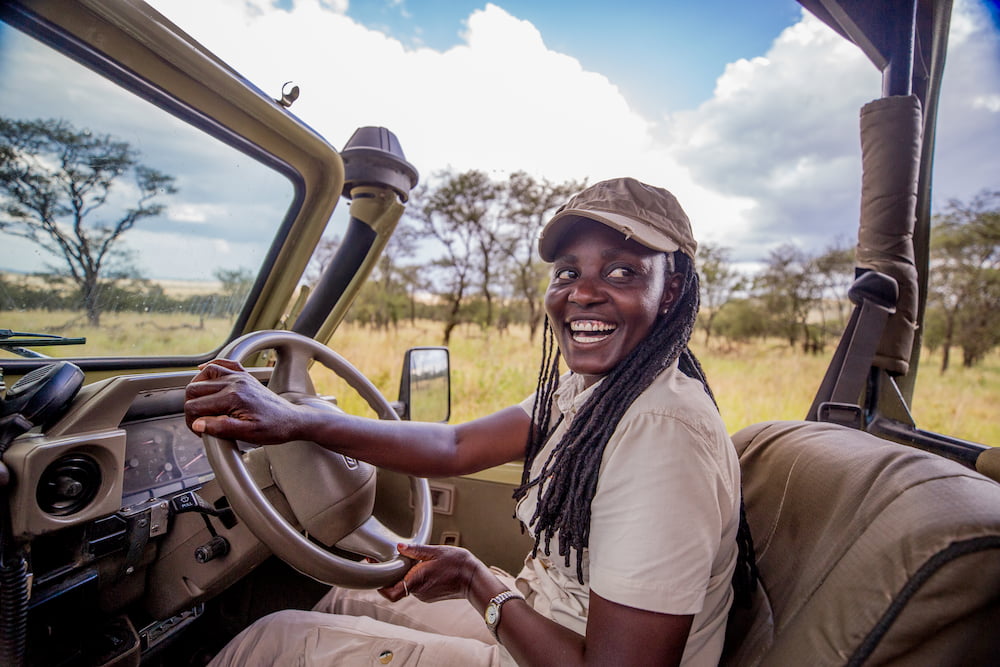What do you understand by Responsible Tourism? What does it mean to visit a country that has rebuilt itself against all odds and chosen healing through conservation? Think about what it signifies to move through forests, villages, and wildlife corridors where every footprint you leave carries weight.
In Rwanda, travel follows intention. Communities shape how tourism works. National parks operate through collaborative models that link wildlife protection to community progress.
Gorilla permit revenue strengthens health services and expands access to education in neighbouring districts. Trained guides interpret the environment with insight, purpose, and a sense of pride.
What happens on safari connects directly to what happens beyond it.
When you choose to visit Rwanda, your choice becomes part of that connection. Each decision you make, from the accommodation you choose to the conversations you hold, shapes an outcome. These choices influence livelihoods, conservation efforts, and the dignity of shared spaces.
This guide offers a grounded framework for travelling with awareness. If you’re preparing for a safari in Rwanda, consider this an invitation to move with care, to ask better questions, and to contribute meaningfully to a system that already works.
Understanding Responsible Travel in Rwanda
Responsible travel begins with a shift in mindset. It invites any tourist who chooses Rwanda over any other destination to move with full awareness of how their presence shapes systems, livelihoods, and environments.
The concept translates directly into how income circulates, how land is managed, and how dignity is upheld in shared spaces.
Since the early 2000s, tourism policy in Rwanda has centred around social equity and environmental recovery. The Rwanda Development Board manages national parks in partnership with conservation bodies such as African Parks and the Wilderness Leadership School.
Ten per cent of all park revenue is returned to communities through the Tourism Revenue Sharing Scheme, which supported over 780 local projects between 2005 and 2023. Permits are limited in number to protect habitats. Ranger training and guiding certifications follow national standards backed by the Ministry of Education and conservation NGOs.
Your visit contributes to this system. Each decision you make shapes tangible outcomes for local communities and protected ecosystems. While the government and its entities have done their part, it comes down to you, the tourist, to front responsible travel when in Rwanda.
Rwanda has built a responsible tourism structure. You choose how you participate in it.
1. Choosing Ethical Safari Operators
Many safari bookings start with dates, prices, and destinations. Few travellers consider how much their choice of operator influences the places they visit. In Rwanda, tourism plays a strategic role in conservation and community development. Therefore, your choice of a tour operator carries a lot of weight when it comes to responsible travel in Rwanda.
Ethical operators build their teams from local communities and provide fair wages backed by formal training. Guides often complete certification through the Rwanda Development Board and participate in continuous development supported by park authorities. These operators follow regulated permit systems and respect official visitor limits inside Volcanoes, Nyungwe, and Akagera National Parks.

They also collaborate with community groups that depend on tourism. Their itineraries include time with women’s weaving collectives, agricultural projects, and cultural organisations such as the Iby’Iwacu Cultural Village in Kinigi. They treat these partnerships with the same care they give to logistics, recognising that tourism shapes livelihoods at every level.
READ ALSO: Inmersion Africa Journeys’ Role in Sustainable Tourism
Operators who follow this model introduce environmental planning into daily operations. Their teams remove plastic, refill water from filtered sources, and maintain fuel-efficient vehicle fleets. Partner lodges use solar power, restrict excess water use, and train all staff in sustainability procedures.
You will recognise such operators by how they conduct themselves. They explain choices clearly, invite local voices into conversations, and honour systems already in place. These are not incidental behaviours. They reflect a deliberate standard.
READ ALSO: Choosing the best Tour Operators in Rwanda
2. Minimising Your Environmental Impact on Safari
Small decisions carry lasting consequences. What you carry, how you move, and how you interact with the environment: all of it becomes part of the ecosystem you enter. Rwanda’s parks may look pristine, but their protection depends on regulation, restraint, and participation.
a. Energy and Transport Choices
Tourism transport accounts for a major share of fuel use in protected areas. In Akagera National Park, vehicles follow designated tracks to avoid habitat pressure. Travellers who share transport, opt for hybrid models, or work with operators that schedule efficient routes help reduce emissions across entire circuits.
Helicopter transfers, where available, must remain rare exceptions. Most destinations in Rwanda are reachable by road, and well-maintained vehicles leave a lower ecological trace. Even timing matters. Early morning transfers reduce congestion and help guides minimise engine idling at entry gates.

b. Waste and Consumption Habits
Plastic remains banned across Rwanda, including disposable bags and single-use containers. Visitors who pack reusable bottles, sealable pouches, and concentrated toiletries align with national environmental policy.
Lodges that provide filtered water, biodegradable soaps, and refill stations set a baseline. But travellers reinforce that effort when they plan with care.
Leftover items from packaged food, toiletries, or camera gear can quickly accumulate. Ask your guide how disposal works in the region. In some locations, all non-compostable waste must be left with you. This isn’t an inconvenience. It’s a form of cooperation.
c. Respect for Protected Ecosystems
Every park in Rwanda sets strict limits on group sizes, trail access, and noise levels. These controls serve ecological balance. By following your guide’s instructions and staying within designated areas, you support the habitat recovery programs that national parks enforce.
Avoid using drones, loud audio gear, or off-trail photography setups. Even short diversions impact nesting grounds and disturb grazing patterns. The wildlife you observe is under constant pressure from human proximity. Your awareness helps maintain their space.
3. Supporting Conservation Through Tourism
Rwanda’s conservation structure depends on tourism. The Rwanda Development Board, in collaboration with private partners, allocates a portion of all tourism revenue to support protected area management.
The country’s flagship Tourism Revenue Sharing Scheme has distributed ten percent of park income to neighbouring communities since 2005, financing over 780 projects by 2023.
This model delivers visible ecological outcomes. In Akagera National Park, managed by African Parks since 2010, tourism revenue contributed to the reintroduction of lions in 2015 and black rhinos in 2017. Law enforcement improved, and by 2023, the park recorded zero high-impact poaching incidents for nearly three consecutive years. In Volcanoes National Park, strict permit limits help fund ranger salaries, gorilla monitoring, and research programs in partnership with the Dian Fossey Gorilla Fund. Park infrastructure and staff housing have also improved under this system.
Every permit fee, guide service, and lodge stay feeds into this mechanism. When you travel in Rwanda’s protected areas, you contribute directly to the systems that guard their future. That’s not a promise. It’s a transaction with clear outcomes.
4. Engaging with Local Communities Respectfully
To visit a community in Rwanda is to enter a social structure shaped by history, recovery, and restraint. People live close to national parks, often within walking distance of the forests that define Rwanda’s tourism economy. Homes border conservation zones. Children walk past safari vehicles on their way to school. Respect here begins with understanding that tourism moves through daily life, not outside it.
Meaningful interaction happens in quiet, grounded ways. At Ride 4 a Woman, based near Bwindi Impenetrable Forest, visitors meet women who repair bikes, tailor uniforms, and lead counselling circles for survivors of domestic violence. These women set their pricing and run their own workshops.
At the Iby’Iwacu Cultural Village, near Volcanoes National Park, former poachers now work as cultural interpreters and conservation educators. Visitors participate in traditional crafts, music, and guided story-sharing sessions designed and managed by the community.
Photography requires permission. Conversations deserve time. Some moments are not meant to be documented. An ethical visit includes asking before filming, choosing cooperatives with transparent pricing, and supporting programs that are operated locally, not filtered through intermediaries.
These decisions may seem small. But they signal something deeper. When you travel through someone’s home, your actions reflect what kind of guest you choose to be. Rwanda’s communities see everything. They remember the travellers who stayed present.
5. Packing Responsibly for a Low-Impact Safari
Packing sets the tone for how you, as a tourist, will move through Rwanda. You therefore need to pack with intention and not assumption. The items you carry shape how lightly you travel across places that already manage their environmental limits carefully.
Rwanda maintains one of the most rigorous environmental protection frameworks in East Africa. The importation and use of plastic bags remains prohibited under national law. Tourists should prepare with reusable toiletry containers, cloth pouches, and sealed fabric storage. Tour operators and accommodation facilities often provide filtered water refills and biodegradable hygiene products. By aligning your packing habits with these systems, you cooperate with a structure designed to function long after your departure.
Energy use begins in the suitcase. Solar-powered torches, low-energy power banks, and unscented, concentrated toiletries reduce the burden on facilities operating in energy-conservation zones.
Items like disposable batteries or aerosol sprays offer convenience but add to waste logistics in areas without central disposal. Small changes matter. Conservation-based lodges already manage limited power storage, and visitors who pack with that in mind share the responsibility.
Finally, packing shows how one intends to move through society. Rwanda places high value on modesty and self-presentation. Neutral clothing that covers shoulders and knees works best in community settings.
Strong perfumes, flashy accessories, or disruptive grooming tools can unsettle rather than connect. What you wear shapes how you are received. Packing with care means preparing for mutual dignity.
Final Thoughts: Travel as a Force for Good in Rwanda
Every safari in Rwanda contributes to a system that balances protection with participation. The question is not whether you leave an impact: it is what kind of impact can you leave behind.
This country has built its tourism model with intention. It protects what it values, shares what it can, and invites visitors to join without overwhelming the space. To prioritise Responsible Travel when in Rwanda is to recognise that the smallest action. It can be a booking, a question, or a moment of restraint,
If you are planning your trip, choose a partner that operates with the same clarity.
Inmersion Africa Journeys works directly with conservation authorities, certified local guides, and community-owned initiatives. Every itinerary reflects care, structure, and respect for place.
🐾 Email: info@inmersionafrica.com
🌿 Call: (+250) 784 988 972
